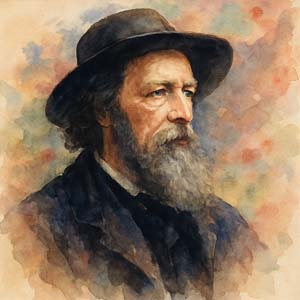These three alone lead life to sovereign power.”
— Lord Alfred Tennyson
 Born in Somersby, Lincolnshire, England, poet Lord Alfred Tennyson (1809–1892) was the most famous poet of the Victorian era. Queen Victoria once said that, next to the Bible, she most valued his poetry for its morality and faith in humanity.
Born in Somersby, Lincolnshire, England, poet Lord Alfred Tennyson (1809–1892) was the most famous poet of the Victorian era. Queen Victoria once said that, next to the Bible, she most valued his poetry for its morality and faith in humanity.
“'Tis better to have loved and lost than never to have loved at all,” he wrote with timeless wisdom.
Named Great Britain’s Poet Laureate in 1850, Tennyson was celebrated for his exquisite craftsmanship and creativity. As a wide-eyed child, he was captivated by Sir Thomas Malory’s Arthurian legends — tales that stirred his soul. Years later, those early dreams would bloom into Idylls of the King (1859–1885), twelve luminous poems chronicling the rise and fall of Camelot, written with reverence and longing.
“I tried in my Idylls to teach men the need of an ideal,” he explained. A master of rhythm, mood, and imagery, Tennyson observed, “Knowledge comes, but wisdom lingers.”
Among his other celebrated works: the epic Ulysses (1842), inspired by Dante's Inferno; In Memoriam (1850), a lament for lost friendship; and The Charge of the Light Brigade (1854), honoring the heroism of those who fought in the Crimean War.
“My strength is as the strength of ten, because my heart is pure,” he declared, embodying the Victorian spirit of resolve.
Biographer Henry van Dyke offered this praise: “In the future, when men call the roll of poets who have given splendor to the name of England, they will begin with Shakespeare and Milton — and who shall have the third place, if it be not Tennyson?” His legacy endures not only in epic verse, but in the quiet strength of those who seek beauty, truth, and the courage to dream.
 Own your strength.💜
Own your strength.💜
